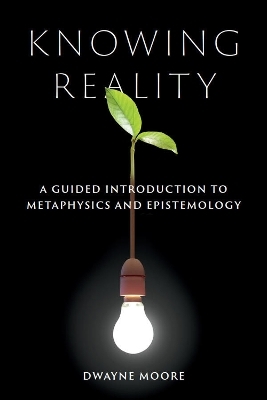
Knowing Reality
Broadview Press Ltd (Verlag)
978-1-55481-530-2 (ISBN)
Knowing Reality is a guided introduction to metaphysics and epistemology. Each of the book's twelve chapters contains extended excerpts from influential historical and contemporary philosophers, as well as a guided exposition of their views and their locations within the logical space of the issues at play. Topics are introduced through engaging thought experiments, with relevant philosophical puzzles sprinkled throughout. Complex issues are explained using down-to-earth examples, with illustrations provided to connect with readers and assist them in understanding the sophisticated concepts under discussion.
Dwayne Moore is Associate Professor of Philosophy at the University of Saskatchewan.
Introduction
Chapter 1: Philosophy and Sophistry
1.1 Ancient Greek Mythology
1.2 Ancient Greek Philosophy
1.3 Sophism
1.4 The Upside of Philosophy
1.5 How to Win an Argument
Summary
Chapter 2: Truth and Relativism
2.1 Correspondence Theory
2.2 Coherence Theory
2.3 Pragmatic Theory
2.4 Relativism
Summary
Chapter 3: Substances – Change and Sameness
3.1 Milesian Materialism
3.2 Eleatic Idealism
3.3 Substratum Theory
3.5 Perdurantism
Summary
Chapter 4: Personal Identity
4.1 Soul Theory
4.2 Bundle Theory
4.3 Psychological Theory
Summary
Chapter 5: Mind and Brain
5.1 Dualism
5.2 Mind-Brain Identity Theory
5.3 Functionalism
5.4 Eliminative Materialism
5.5 Idealism
Summary
Chapter 6: Free Will and Determinism
6.1 Hard Determinism
6.2 Libertarianism
6.3 Compatibilism
Summary
Chapter 7: Knowledge
7.1 Propositional Knowledge
7.2 Descartes’ Rationalism
7.3 Hume's Empiricism
7.4 Naturalized Epistemology
7.5 Social Epistemology
Summary
Chapter 8: Perception
8.1 Direct Realism
8.2 Skepticism
8.3 Representational Model
8.4 Idealism
8.5 Intentionalism
Summary
Chapter 9: Self-Knowledge
9.1. Inner Sense Model
9.2 Behaviourism
9.3 Acquaintance Model
9.4 Externalist Models
9.5 Self-Deception
9.6 Rationality and Irrationality
Summary
Chapter 10: Philosophy of Science
10.1 Aristotle
10.2 Francis Bacon
10.3 David Hume
10.4 Immanuel Kant
10.5 Logical Positivism
10.6 W. V. O. Quine
10.7 Helen Longino
Summary
Chapter 11: God and Naturalism
11.1 The Cosmological Argument for Theism
11.2 The Naturalistic Argument for Naturalism
11.3 The Teleological Argument for Theism
11.4 The Problem of Evil
Summary
Chapter 12: Religious Experience, Faith, and Reason
12.1 Varieties of Religious Experience
12.2 Religious Experience as Delusions
12.3 The Principle of Credulity and the Principle of Testimony
12.4 Naturalistic Accounts
12.5 Reason and Faith
12.6 Fideism
12.7 Evidentialism
12.8 The Belief Model
Summary
Appendix 1: How to Write an 'A' Paper
1. Thesis Statement
2. Roadmap
3. Logical Structure
4. Sentence Structure
5. Original Ideas
6. Accurate Portrayal of Philosophical Positions
7. Effective Critiques of Philosophical Positions
8. Quotations and References
| Erscheinungsdatum | 20.07.2023 |
|---|---|
| Zusatzinfo | 100 Illustrations, black and white |
| Sprache | englisch |
| Maße | 165 x 229 mm |
| Gewicht | 561 g |
| Themenwelt | Geisteswissenschaften ► Philosophie ► Erkenntnistheorie / Wissenschaftstheorie |
| Geisteswissenschaften ► Philosophie ► Geschichte der Philosophie | |
| Geisteswissenschaften ► Philosophie ► Metaphysik / Ontologie | |
| Geisteswissenschaften ► Philosophie ► Philosophie der Neuzeit | |
| ISBN-10 | 1-55481-530-4 / 1554815304 |
| ISBN-13 | 978-1-55481-530-2 / 9781554815302 |
| Zustand | Neuware |
| Informationen gemäß Produktsicherheitsverordnung (GPSR) | |
| Haben Sie eine Frage zum Produkt? |
aus dem Bereich

![Was heißt Denken?. Vorlesung Wintersemester 1951/52. [Was bedeutet das alles?] - Martin Heidegger](/media/113619842)
